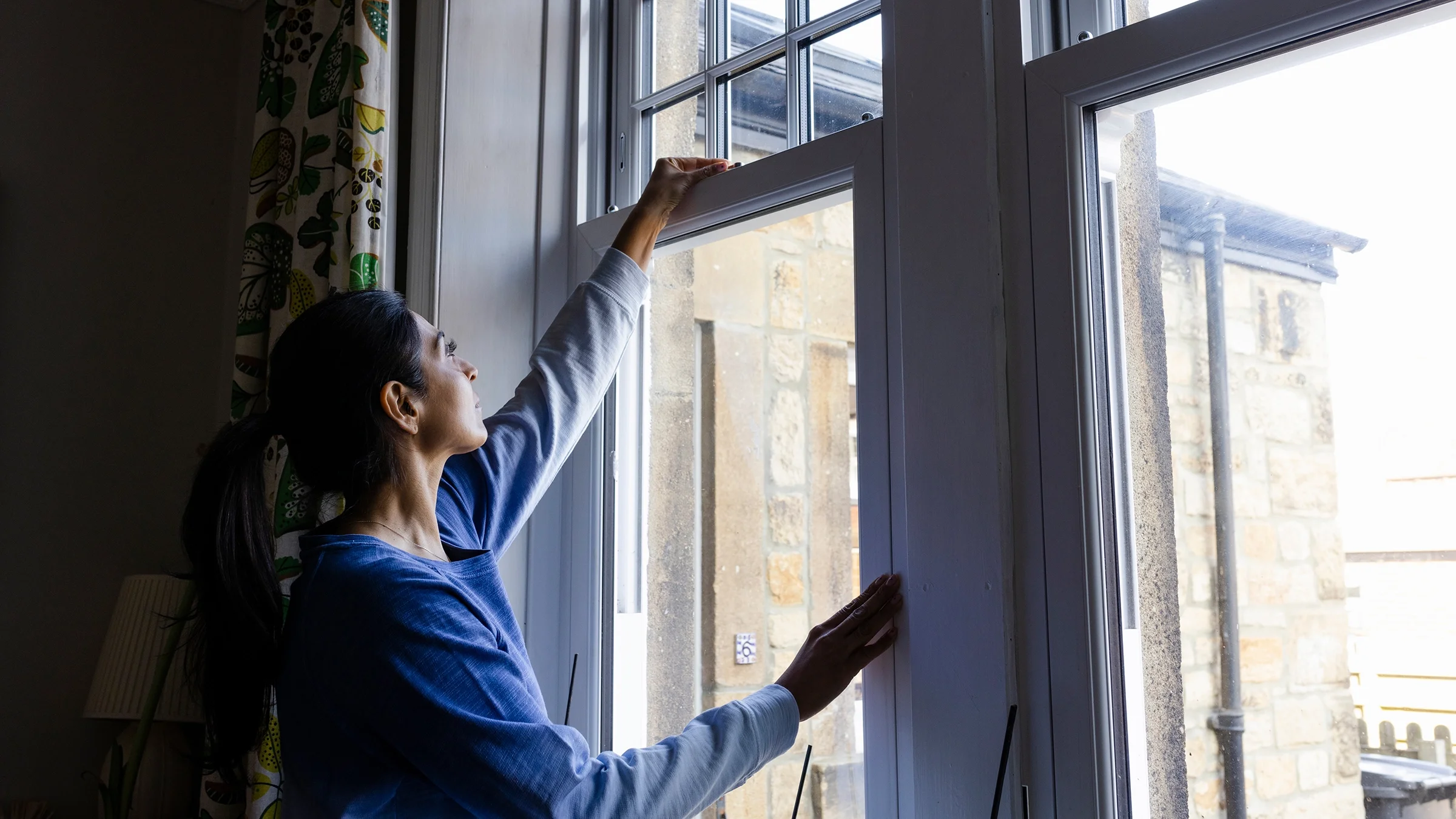Key takeaways:
Seasonal allergies can trigger uncomfortable symptoms, like nasal congestion, sneezing, and runny nose.
Over-the-counter and prescription medications are proven ways to manage allergy symptoms. But self-care and home remedies can help, too.
Air filtration systems and changing your cleaning routine can help lower your exposure to allergens. This may help improve your symptoms and may even help your medications work better.
Spring’s arrival means the return of sun, blooms, and daylight after long, cold winter days and nights. But, for some people, spring also marks the return of allergy season and uncomfortable symptoms, like sneezing, itching, and watery nose and eyes.
That’s because pollen from grass, trees, and weeds are one of the most common triggers for allergic rhinitis. And pollen counts start to rise during spring months. Depending on your allergies, high pollen counts may continue to trigger your symptoms well into the fall.
Luckily, there are many medications that can help treat and even prevent symptoms of allergic rhinitis. Over-the-counter (OTC) and prescription options include non-drowsy antihistamines and steroid nasal sprays. But avoiding your triggers is actually one of the best things you can do to limit your allergies. Avoiding allergens not only lessens your symptoms, it also reduces inflammation in your body and can lower your chances of allergy-triggered asthma attacks. Though avoiding pollen completely is nearly impossible, there are steps you can take to lower your exposure.
This allergy season, try these 5 self-care tips for allergic rhinitis.
1. Focus on indoor air quality
Indoor air quality can have a huge impact on your allergies. Taking the time to ensure you have the right indoor air quality is key to allergic rhinitis self-care. Many people with allergies find relief when they install air filtration systems.
Air filtration devices trap allergens, removing them from the air. Air filters can be set up in specific rooms or be incorporated into the air and ventilation system for your entire home.
Air purifiers are a simple type of air filtration system. They can be a good first step if you’re not able to invest in larger air filtration systems. For best results, make sure your air filter has a high-efficiency particulate (HEPA) filter. Keep the humidity setting below 50% to prevent mold growth.
Consider running a dehumidifier in your home. These can help lower the amount of dust and mold in your home. Dehumidifiers can be added to your HVAC system. You can also use smaller, stand-alone units in damper parts of your home, like bathrooms and the kitchen.
You can also consider getting your home’s ducts cleaned. There’s no clear evidence that cleaning ducts improves allergy symptoms. But many experts recommend duct cleaning if you notice that your allergy symptoms get worse when you first turn on the heating or cooling systems in your house. This can be especially helpful if you have dust allergies as well as season allergies.
Need help choosing a nasal spray? Our pharmacy experts review the best over-the-counter nasal sprays for allergy relief.
Medications aren’t your only option. Learn more about natural remedies for seasonal allergies.
There’s no one-size-fits-all approach to seasonal allergies. One woman shares what she uses to manage her asthma and allergy symptoms.
2. Develop an allergen-focused cleaning routine
To lower the amount of allergens in your home, it’s important to use the right cleaning routine, especially when pollen counts are high. Sticking with a cleaning routine all year can also lessen the amount of year-round allergens, like dust and dander. It may also help lower the chances of mold growth.
Here are some practical tips for an allergen-focused cleaning routine:
Vacuuming: Vacuum rugs and carpets at least once a week. Use a vacuum with a HEPA filter. Change or clean filters, bags, and canisters regularly.
Dusting: Dust your home at least once a week. Using a top-down approach when dusting helps dust settle to floors, which you can then mop. When dusting, use a damp microfiber cloth instead of a duster or other dry dusting technique. Damp wiping helps trap dust and allergens. Make sure to wash microfiber cloths after every use. Make sure to dust light fixtures, fans, window blinds, and other surfaces where dust can accumulate.
Washing: Wash clothes, towels, and bedsheets regularly. For items you can’t wash or can’t wash easily, like mattresses and pillow covers, invest in an allergy-friendly zippered cover. Consider switching to washable drapes and rugs and wash them regularly, too. If washable products aren’t an option, consider getting rid of rugs, drapes, and cushions that you don’t need.
Protect yourself: Wear a mask while you clean. This will lower your exposure to dust and allergens. If possible, have someone else clean your home for you and leave the house while they’re cleaning.
- PrednisoneGeneric Deltasone and Rayos and Sterapred
- Promethazine DMGeneric Pherazine DM
- MedrolMethylprednisolone
3. Close your windows
A breath of spring air can feel great after a long winter. But, unfortunately, that fresh air also brings fresh pollen into your home. Keeping your windows open can undo all your hard work from cleaning and managing your indoor air quality.
Screens aren’t enough to keep pollen and allergens out of your home. Keep your windows closed when pollen counts are high. Several websites monitor local pollen counts. Find one that tracks pollen in your area, and use the prediction tools to help you know when it’s best to keep your windows shut.
Remember to keep your car windows rolled up, too. Pollen can get into your car and settle into the fabric seats, worsening your allergies. You may want to add regular vacuuming and wiping down of your car’s interior to your cleaning routine when pollen counts are high.
4. Change your pet’s routines
There’s clear evidence that owning a pet is good for your wellbeing. But pets aren’t always great if you have allergic rhinitis. It’s important to change your pet’s routines if pet dander triggers your allergies.
Keep your furry friend off furniture and out of your bed. This will limit the amount of fur and dander settling in these harder-to-clean areas. You may even want to designate your bedroom as a no-pet zone.
Make sure to regularly wash your pet’s bedding. Also, mop floors and wet-wipe areas where your pet spends time. This helps trap dander better than vacuuming and dusting.
Bathe your pet once a week. This will help lower the amount of dander your pet releases. Consider having your pet professionally groomed. This will help you avoid dander exposure while bathing and brushing your pet’s fur.
Having allergies doesn’t mean you have to get rid of your beloved pet. But it does mean prioritizing certain steps so that you can both be comfortable and happy.
5. Try nasal saline rinses
No allergy-care list would be complete without mentioning nasal saline rinses. Nasal saline rinses are one of the best self-care steps you can take if you’re living with seasonal allergies.
Nasal rinses have been shown to relieve allergy symptoms. They help rinse away lingering allergens and clear out mucus and secretions. High-quality studies suggest routine saline rinsing can be as effective as steroid nasal spray for managing allergy symptoms. Plus, nasal saline rinses are safe, if used properly.
You can purchase ready-to-use saline rinses at your local retail pharmacy or grocery store. They come in sprays, pumps, and squirt bottles. Some saline rinses come ready to use and others should be added to a device, like a neti pot.
It’s best to use sterile saline for nasal rinses. If you make your own saline rinse, always use sterile water and make a fresh batch every time. Don’t use regular tap water for saline rinses, since this can put you at risk for developing life-threatening infections.
When should you seek care for allergic rhinitis?
Many people are able to manage their allergies with a combination of OTC medications, home remedies, and self-care.
But some people need more help. Here are some signs you should seek care for allergic rhinitis:
You have eye symptoms. You may have allergic conjunctivitis if you have itchy, watery eyes along with other allergy symptoms. Allergic conjunctivitis can be treated with OTC eye drops. But some people need prescription medications to control their symptoms and keep their vision healthy. It’s best to see an eye doctor if you have symptoms of allergic conjunctivitis.
You have asthma or another lung condition. Allergies can trigger asthma exacerbations and worsen underlying lung conditions. It’s best to seek care if you have asthma or another lung condition. Your healthcare team can make sure your lung condition doesn’t get worse during allergy season by adjusting your regular medications.
You’re taking multiple OTC medications. It’s time to seek care if you find yourself taking multiple OTC products to get your symptoms under control. Your healthcare team can make sure you’re not overdoing it when it comes to OTC products, which can help you avoid unwanted side effects, including rebound congestion. Your healthcare team can also offer prescription options that can help you simplify your treatment.
Your symptoms are affecting your life. Poorly controlled allergic rhinitis can affect your sleep, mood, and ability to concentrate. Kids can have behavioral changes and trouble learning. Get help if your allergies are making it hard to sleep or complete your daily activities.
The bottom line
Seasonal allergies can cause uncomfortable symptoms and disrupt your day-to-day life. It’s important to prioritize self-care when dealing with seasonal allergies. Self-care for allergic rhinitis can take many forms, including taking extra steps to minimize allergen contact and taking medications, like nasal spray.

Why trust our experts?


References
American College of Allergy, Asthma and Immunology. (n.d.). Air filters.
Asthma & Allergy Friendly. (n.d.). Bedding.
Asthma and Allergy Foundation of America. (2015). How can I control indoor allergens and improve indoor air quality?
Cedars-Sinai Staff. (2018). Reducing allergens at home. Cedars-Sinai Blog.
Centers for Disease Control and Prevention. (2024). About how to safely rinse sinuses.
Ciprandi, G. (2023). Self-management in allergic rhinitis: Strategies, outcomes, and integration into clinical care. Journal of Asthma and Allergy.
Head, K., et al. (2018). Saline irrigation for allergic rhinitis. Cochrane Database of Systematic Reviews.
McMillen, M. (2018). Should air ducts be on your spring cleaning list? Allergy Asthma Immunology of Rochester.
Northeast Allergy. (n.d.). How to limit pet dander to avoid allergies.
United States Environmental Protection Agency. (2024). Should you have the air ducts in your home cleaned?














